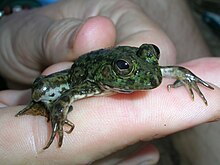Euphlyctis cyanophlyctis
| Euphlyctis cyanophlyctis | |
|---|---|

| |
| A female Euphlyctis cyanophlyctis | |

| |
| Female (♀) from West Bengal, India | |
| Scientific classification | |
| Domain: | Eukaryota |
| Kingdom: | Animalia |
| Phylum: | Chordata |
| Class: | Amphibia |
| Order: | Anura |
| Family: | Dicroglossidae |
| Genus: | Euphlyctis |
| Species: | E. cyanophlyctis
|
| Binomial name | |
| Euphlyctis cyanophlyctis (Schneider, 1799)
| |
| Synonyms | |
|
Rana cyanophlyetis Schneider, 1799 | |
Euphlyctis cyanophlyctis is a common dicroglossid frog found in South Asia.[1] It is known under numerous common names, including Indian skipper frog or skittering frog.[2] They are often seen at the edge of bodies of water with their eyes above the water. They noisily move away from the shore when disturbed, giving them their common name. They are rarely seen outside water.

Description

Description from George Albert Boulenger is:[3] «Vomerine teeth in two small oblique series extending a little beyond the hinder edge of the choanae. Head moderate; snout scarcely pointed; canthus rostralis indistinct; interorbital space much narrower than the upper eyelid; tympanum distinct, about two-thirds the size of the eye. Fingers slender, pointed, first not extending beyond second; toes webbed to the tips, which are pointed, fourth not much longer than third or fifth; outer toe strongly fringed; subarticular tubercles small; inner metatarsal tubercle small, conical, much like a rudimentary toe. The tibiotarsal articulation usually reaches a little beyond the eye. Skin with small tubercles and units above, and with more or less distinct rows of pores. Brown or olive above, dark spotted or marbled; two blackish streaks on the hinder side of the thighs, seldom absent; beneath often speckled with blackish. Male with two external vocal vesicles, opening by two slits beneath the angles of the mouth.»
They have the ability to leap out of the water from a floating position.[4] Cross section of the phalanx bones shows annual growth rings which may be used for determining age.[5]

Distribution
The species is widely distributed in South Asia and Southeast Asia, from southeastern Iran, southern Afghanistan, Pakistan, Bhutan, Nepal, and eastern India at low to moderate elevations east through Bangladesh and northeastern India to extreme western Myanmar. In addition, records exist from Sri Lanka (likely Eyphlyctis mudigere), Thailand (possibly introduced), and Vietnam.[2] It has recently been reported also from Bhutan.[2][6] Records for Bangladesh have recently been reassigned to Euphlyctis kalasgramensis.[2] The International Union for Conservation of Nature (IUCN) does not include any areas east from India and Bangladesh in the distribution area.[1]
Taxonomy
This widespread species may contain cryptic species. As currently defined, E. cyanophlyctis includes several species as synonyms. These subspecies are sometimes distinguished:[2]
- E. c. cyanophlyctis – common skittering frog
- E. c. seistanica – Seistan skittering frog
- E. c. microspinulata – spiny skittering frog
Habitat
This frog is a very aquatic species found in marshes, pools and various other wetlands.[1]
References
- ^ a b c d Khan, M.S.; Papenfuss, T.; Anderson, S.; Rastegar-Pouyani, N.; Kuzmin, S.; Dutta, S.; Manamendra-Arachchi, K. & Sharifi, M. (2009). "Euphlyctis cyanophlyctis". IUCN Red List of Threatened Species. 2009: e.T58260A86626211. doi:10.2305/IUCN.UK.2009.RLTS.T58260A11745753.en. {{cite iucn}}: error: |doi= / |page= mismatch (help)
- ^ a b c d e Frost, Darrel R. (2016). "Euphlyctis cyanophlyctis (Schneider, 1799)". Amphibian Species of the World: an Online Reference. Version 6.0. American Museum of Natural History. Retrieved 24 August 2016.
- ^ Boulenger, G. A. (1890). Fauna of British India, including Ceylon and Burma. Vol. Reptilia and Batrachia. London: Taylor and Francis. 570 pp.
- ^ Nauwelaerts, Sandra; Scholliers, Jan; Aerts, Peter (2004). "A functional analysis of how frogs jump out of water". Biological Journal of the Linnean Society. 83 (3): 413–420. doi:10.1111/j.1095-8312.2004.00403.x.
- ^ Kumbar, Suresh M.; Pancharatna, Katti; Gatten Jr., R. E. (2002). "Annual growth layers in the phalanges of the Indian skipper frog Rana cyanophlyctis (Schn.)". Copeia. 2002 (3): 870–872. doi:10.1643/0045-8511(2002)002[0870:AGLITP]2.0.CO;2. JSTOR 1448170.
- ^ Wangyal, J. T. (2013). "New records of reptiles and amphibians from Bhutan". Journal of Threatened Taxa. 5 (13): 4774–4783. doi:10.11609/JoTT.o3539.4774-83.
- IUCN Red List least concern species
- Euphlyctis
- Amphibians of Afghanistan
- Amphibians of Bangladesh
- Amphibians of Bhutan
- Amphibians of Myanmar
- Amphibians of Nepal
- Frogs of India
- Amphibians of Iran
- Amphibians of Pakistan
- Frogs of Sri Lanka
- Amphibians of Thailand
- Amphibians of Vietnam
- Amphibians described in 1799
- Taxa named by Johann Gottlob Theaenus Schneider

